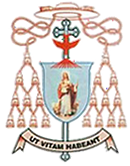- +234 9070497007
- info@archbishopvalokeke.org
50th Anniversary of Priestly Ordination of Most Rev. Dr. Emmanuel Otteh @ The Basilica of the Most Holy Trinity, Onitsha.
“MY SOUL GLORIFIES THE LORD, MY SPIRIT REJOICES IN GOD MY SAVIOR” LK. 1:46
Today as we celebrate 50years of priesthood and priestly ministry of His Lordship the Most Rev. Emmanuel Nwafo Otteh, we have reasons to prayerfully sing with him in the words of Our Blessed Mother, my soul glorifies the Lord, and my spirit rejoices in God my savior.
1. The Event: The Golden Jubilee of Priesthood (50 Years Anniversary)
The event of today is what we call a Golden Jubilee. It is good to recall that jubilee was originally a Jewish institution, an Israelite institution celebrating their deliverance from Egypt – the land of slavery and entrance into the Promised Land. Thus the Lord declared to them “you will declare this fiftieth (50th) year sacred and proclaim the liberation of all the inhabitants of the land … This is to be a jubilee year for you…” Lev. 25: 8-15.
The high points of the jubilee year are thanksgiving to God, reconciliation with God and fellow humans, freedom from slavery and from imprisonment as well as regaining of alienated properties.
Christian Jubilee:
From the mediaeval times, Holy Mother the Church applied the jubilee to the Church. The year of the Lord’s favour has come through the mystery of the incarnation. The ultimate liberation which is liberation from the slavery of sin took place through the redemptive work of Christ. It is the Christ event that the Church celebrates as our Christian jubilee. The first Christian jubilee was celebrated in the year 1300. Pope Boniface VIII issued a papal bull Antiquorum habet through which he decreed that every 100 years, a universal jubilee should be celebrated in the Church. Pope Clement VI reduced it to 50 years, Pope Urban VI to 33 years, while Pope Paul II in the year 1470, finally reduced it to 25 years. This custom has remained till our days today. Hence we have our Christian Jubilee every twenty five years. Then with the passage of time they have acquired such names like:
25 – Silver Jubilee
50 – Golden Jubilee
75 – Diamond Jubilee
100 – Centenary
Personal and Institutional Jubilees:
From the treasured Church tradition, communities, Church organizations and individuals – priests and religious men and women have learnt to celebrate the jubilee of their religious calling or the foundation of their institution.
In all, Jubilee remains a year of thanksgiving, a year of reconciliation with God and man, a year of repentance and forgiveness, a year of rebirth in the Lord, a year of grace.
2. Jubilee of Bishop Emmanuel N. Otteh: Lessons to Learn.
There is temptation to sketch the biography of Bishop Otteh. This I will resist. Fr. John Sigo has attempted that and His Lordship has written a modest Autobiography last year, 2010. Moreover, his recent publications namely – my journey to the priesthood and my reasons for giving thanks paint an admirable picture. I prefer to go into the lessons we can learn from this gift of God in the person of His Lordship, Most Rev. Emmanuel Otteh.
His Lordship is a teacher, a formator, a builder, an administrator, a pastor, an organizer, a lover of God and his people, a holy priest and a patriot. He is endowed with many gifts of nature and Grace and these he uses wisely to God’s glory and to the benefit of His people.
As a teacher:
Bishop Otteh does not only enjoy robust health, he is gifted with good brains. His high intelligence and photographic memory cannot be doubted. Recall that out of one hundred boys that took entrance exam into the junior Seminary in 1948 (for January 1949), only ten were successful and he was one of them.
This intelligence is more evident in the life of Bishop Otteh as a teacher. For example, when they finished their Cambridge examinations as junior Seminarians, he was retained for two years to teach other students – seminarians especially the exam class. Even when the syllabus was changed from British Empire history which he studied to European history which he did not study, the students preferred to have him as their teacher than a graduate who was an European. He taught them and they passed with distinction.
Among his students were the late Archbishop A.K. Obiefuna, His Lordship, Bishop Gregory Ochiagha, Bishop S.A. Okafor among many others.
It is on record that Bishop Otteh teaches so well that any of his students who does not pass his subject will actually blame himself or perhaps consider himself unfit for academic work. This is because he spends time to prepare his lessons. This is a very important lesson for teachers and formators.
As a Formator:
As a formator in the Seminary, Bishop Otteh knew all the seminarians by name. Most of the time, he would know the Seminarian, his parents, his town, the circumstances of his birth and his personal history. This helped him to treat each Seminarian as a unique individual. He gave each person attention as if he is an only son and a beloved child. This is the attitude of a good shepherd which calls for emulation.
In addition, after studying under Bishop Otteh, you are proud to say I was his student. There must be an aspect of him which you cannot help but admire and retain. He leaves his stamp on you which you are proud to display.
As a Builder:
Bishop Otteh’s intelligence is not abstract or theoretical. He translates his ideas into concrete realities. This shines out in his construction works. Bishop Otteh builds to last. He builds like Italian Engineers. The speed and solidity of All Hallows Junior Seminary Seminary reconstruction work after the war, the erecting of St. Paul’s Seminary at Ukpor, the fencing of the Holy Trinity Basilica premises, the construction of the centenary field now Basilica Square, these are his hand work. If you want to know his taste, foresight and ingenuity in construction works then you can look at the Shanahan Hall Complex. He conceived and started that work with Archbishop Arinze and the work continued until he left.
If you go to Issele Uku, the reconstruction and fencing of the Bishop’s house, the reconstruction of the junior Seminary, the pastoral centre, the Cathedral etc all were accomplished with the expertise, speed and finesse which only one like Bishop Otteh would give.
As An Administrator:
Bishop Otteh has eyes for details. He is an organizer, a motivator; one can call him a workaholic except that he has time for his prayers and pleasure. Give him any work and you can consider that work as done. Some have said that the pastoral success of the young, intelligent, pious Archbishop Arinze at Onitsha was partly because he knew how to choose good co-workers like Msgr. E. Otteh who chaired for him the committee on Papal visit of 1982, committee of the Centenary celebration of 1985 among many others.
Bishop Otteh was part of the rising profile of Onitsha Archdiocese at his time due to his administrative acumen and astuteness.
As a Pastor:
Bishop Otteh can best be remembered as a good pastor following the steps of Our Lord the Good Shepherd. A good pastor is ready to lay down his life for the sheep; a good pastor provides pasture for the sheep always preoccupied with the wellbeing of the sheep. A good pastor comes that the sheep may have life in abundance, (cf. John 10:10ff).
Think of the way he organized and followed the seminarians from place to place risking his life during the war as a Rector to make sure they were not lost. Think of his effort to feed the seminarians after the war begging the C.W.O. to contribute food so that the Seminarians do not starve. Think of his life style, simple, humble, chaste, obedient to his superiors and prayerful. His attitude to prayer is such that prayer is his second nature. He is always praying whenever his is not engaged in another heavy duty.
He knows that a minister teaches more with his life than his preaching. His Lordship‘s life is a more eloquent preaching than his sermons.
What of on-going formation. Here Bishop Otteh excels. He is never tired of learning. Throughout his priestly life, the Bishop has engaged in formal and informal learning. Having been ordained in 1961, he left for Rome soon after ordination for further studies – specializing in Canon Law. In 1977, he was again in Rome at the Gregorian University for a Diploma course in Diocesan Tribunal. In 1992, two years after his ordination as a Bishop, he was once more again ready to go through the stress of further studies, this time in Kent, England. There he obtained another diploma in Relationship, Spiritual Counseling and Community living.
It is on record that when Bishop Otteh went to Issele Uku, there were no functional telephone lines. He quickly bought an analogue cell phone – the type that existed in Nigeria then, learnt everything about it, mounted a mast, an antenna of over fifty feet and was able to receive phone calls and fax messages through his cell phone. He immediately bought a computer to upgrade the services and facilities in the Bishop’s house. His was the first computer in the diocese.
In his old age, Bishop Otteh updates himself and makes use of the most modern facilities.
Are we to talk about his Sermons, his knowledge of the teachings of the Church, the laws of the Church and liturgy? These are the areas he excels as a pastor. To God be all glory and never ending praise for ever.
3. What can we Learn?
The Batton of faith is being handed over from generation to generation. We should not allow the batton to fall nor the light to diminish during our own time. The Bishop is an inspiration, he is an encouragement, he is a role model, a teacher, a mentor. It is a privilege to have known him. The Holy Bible urges us to remember our leaders who taught us the word of God and as we reflect on the outcome of their work we should imitate their faith, (cf. Heb. 13: 7-9).
To His Lordship, we say congratulations. You have reasons to thank God and be happy. Remember jubilee is an opportunity to rededicate ourselves to God and renew filial love. You now have more time for prayers and holiness which you love so much.
Please, pray for us so that the seed which God has used you and others to plant so firmly will not suffer neglect in our hands.
We love you Bishop and we pray for you. May God include your name among the sanctified.
Congratulations!!!
50 GOLDEN CHEERS!!!
Homily delivered by
+ Valerian M. Okeke
Archbishop of Onitsha
Address List
- Onitsha Catholic Secretariat. Basilica Of The Most Holy Trinity. P.O.Box 411, Onitsha
- +2348021818008
-
contact@archbishopvalokeke.org
Social Networks
- Archbishopval
- @AbvalOkeke
- archbishopvalerianokeke
- Onitsha Archdiocese

